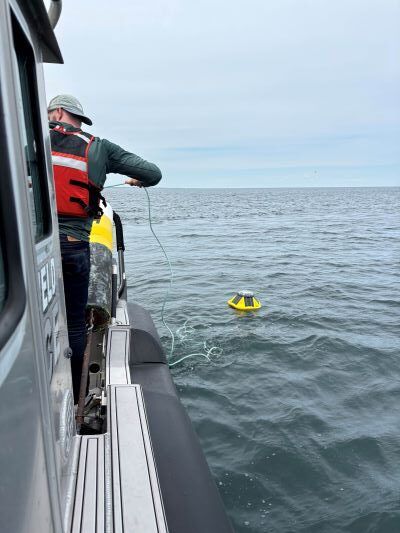The Marshfield Coastal Hazards Lab Team at the Atlantic Resiliency Innovation Institute (ARII), a nonprofit organization focused on creating a science-based community to address coastal hazards and enhance regional resiliency, recently marked a major milestone with the launch of its inaugural wave and wind sensor, the first of real-time monitoring tools to be deployed by the research team to better understand and respond to coastal hazards along the Marshfield shoreline.
The launch initiates a three-phased strategy to address what ARII founders Jeremy Devaney and Lara Brait have identified as a critical gap in data utilization. While numerous organizations monitor coastal conditions, data mined from these studies is seldom transformed into actionable solutions.
“The real-time data collected by our sensors will help us to bridge the gap between observation and action,” said Devaney. “This technology will help guide innovative, science-based solutions for our shoreline and beyond – a huge step forward in resiliency and action.”
The initial sensor is collecting real-time data that includes wave height, wave direction, water temperature, barometric pressure, and wind speed and direction. ARII has made the data public through the CUMULUS platform at https://cumulus.coastalmeasures.com/waves/spotter/SPOT-32442C, which is also shared via a dashboard with members of the Marshfield community at places like the police station, local surf shops, and other locations.
The institute also plans to deploy more sensors and buoys that can additionally track the amount of oxygen dissolved in water, turbidity, and salinity, and eventually measure coastal erosion in real time.
The goal is to create a regional sensor network that will monitor the processes affecting coastal resiliency in real-time,” said Josh Humberston, Ph.D., director of the Marshfield Coastal Hazards Lab. “And all of this is moving toward creating a collective data forecasting tool to determine what risks are headed for our coastline in different conditions, and which areas may need to be prioritized. “The data provided will allow for real-time decision-making,” Humberston continued.
Longer term, Humberston pointed out, with 10% of coastal town budgets currently directed toward maintaining the sea wall, and with another foot of sea level rise expected over the next 10 years, another goal is determining how to innovate to get ahead of this and stop the losing cycle faced by town budgets. “Multiplied over the 78 coastal towns throughout Massachusetts, that totals more than a quarter of a billion dollars. If we can create solutions and replicate them throughout the state, we expect these efforts will have an incredibly positive impact throughout these communities, and collectively,” said Humberston.
Once the recently deployed low-cost sensors have collected hyperlocal environmental data – including wave action, water quality and ecological conditions – a computer simulation of the Massachusetts coastline will be created to allow the ARII research team to test various coastal protection strategies. The final phase aims to establish a dedicated physical testing site for coastal protection technologies – a facility unprecedented in the Northeast. “We’re here to help foster collaboration, and we’re working to create a place for others working in this field to use our infrastructure to test their innovations,” added Humberston.
In addition to its environmental benefits, the initiative is expected to generate new economic opportunities. By fostering innovation in coastal resilience ARII’s efforts are positioned to attract investment, create specialized job opportunities, and establish Marshfield as a hub for cutting-edge environmental technology. “Innovative coastal protection starts with a deep understanding of local conditions,” said Brait. “By integrating real-time data with advanced modeling, we’re not only enhancing resiliency but setting a new standard for proactive hazard response.”
About the Atlantic Resiliency Innovation Institute
The Atlantic Resiliency Innovation Institute (ARII) in Marshfield, MA, is a non-profit organization dedicated to creating a science-based community to address coastal hazards and enhance regional resiliency. ARII integrates educational pathways for young adults, develops innovative coastal hazard solutions, and promotes careers in civil engineering, environmental and coastal management fields. ARII houses the Marshfield Coastal Hazard Lab (MCHL) and the Marshfield Coastal Academy (MCA). For more information, please visit www.atlanticrii.org.
Feature Image Courtesy of: ARII
View the original article and our Inspiration here


Leave a Reply